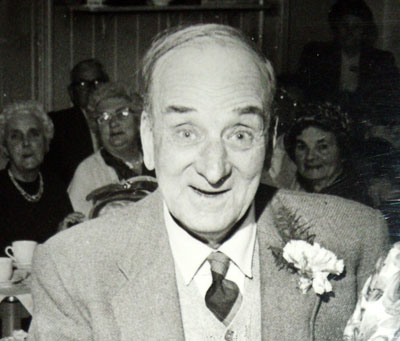Private George William Watt

George William Watt was born on 3 July 1893 at Sunderland, County Durham, the first of seven children of shipyard caulker and cutter John William Watt and his wife Elizabeth (née Allison). By the time of the 1911 Census he was living at 25 Somerset Street, Silksworth, Sunderland, with his parents and his five surviving siblings, and working as a driver in the pit at a coalmine.
Watt enlisted in the cavalry at Sunderland on 3 February 1914 (No.8742), and was posted to the 2nd Dragoon Guards (Queen's Bays). He embarked for France on 30 June 1916, having been posted to the headquarters establishment of the 2nd North Irish Horse Regiment following the formation of that regiment in France from C and F Squadrons and the 6th (Inniskilling) Dragoons Service Squadron. The headquarters, formed in England and comprising 40 officers and men, joined the new regiment in France at the beginning of July.
Watt must have been granted home leave at the beginning of 1917, for on 25 March he married Edith Jennie Edwards at Tunbridge Wells, Kent. The couple had two children over the next five years.
The 2nd NIH Regiment served as corps cavalry to X Corps until August-September 1917, when it was disbanded and its men were transferred to the Royal Irish Fusiliers, an infantry regiment. Like the majority, Watt was posted to the 9th (Service) Battalion, Royal Irish Fusiliers – renamed the 9th (North Irish Horse) Battalion – but some weeks later than most, on 24 October 1917. He was issued regimental number 41631 and posted to D Company.
He probably saw action with the battalion at the Battle of Cambrai in November and December 1917.
Watt was one of the many posted as missing following the 9th (NIH) Battalion's fighting withdrawal from St Quentin from 21 to 28 March 1918 during the German spring offensive. It was later learned that he had been captured on 27 March at Erches, near Roye, when much of the battalion had been overwhelmed by the fast-moving German advance. He remained a prisoner until the end of the war, held at camps including Lechfeld in Germany.
Watt remained in the army following his repatriation, serving in the Egyptian Expeditionary Force in Palestine from 24 June 1919 to 27 December 1920. He was discharged to Section B, Army Reserve, on 20 February 1921, his military conduct recorded as 'very good'.
Following his discharge, Watt lived with his family at 71 Rockdale Road, Tunbridge Wells. He rejoined the cavalry for four years (Army No.389865) on 3 February 1926 and again on 3 February 1930, posted to Section D Army Reserve.
At the time of the 1939 Register Watt was living with his wife and a son at 30 Grainge Road, Tunbridge Wells, and working as a timber porter in the sawmills. He died at Tunbridge Wells on 5 May 1973.
Image, from 1967, sourced from Ancestry.com Public Member Trees - contributor 'tmchris'.
